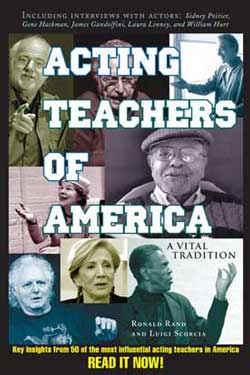Julie Budd
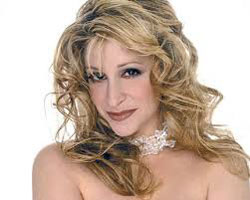 Considered one of the most exciting singers in the world, recently released her newest CD, “The New Classics.” Ms. Budd began her professional career at age twelve appearing on “The Merv Griffin Show.” After hearing her sing, she was dubbed the “Mini Girl with the Maxi Voice.” Subsequently she made more than one hundred appearances on “The Merv Griffin’s Shows. She also sang on “The Tonight Show,” “Entertainment Tonight,” and every major TV show. Ms. Budd has co- starred with such legendary performers as Frank Sinatra, Bill Cosby, Carol Burnett, and Liberace. Her concert performances have included: Lincoln Center, Carnegie Hall, The Kennedy Center, The London Palladium, Tel Aviv’s Israel Performing Art’s Center, Las Vegas, and Atlantic City. She has also appeared with many symphony orchestras, including: Baltimore Symphony, National Symphony, Pittsburgh Symphony, Austin Symphony, Alabama Symphony, Philadelphia Symphony, Boca Pops, Milwaukee Symphony, and Dallas Symphony. As an actress, she appeared on Broadway in Neil Simon’s “They’re Playing Our Song,” and in “On Broadway;” Off-Broadway at Circle Rep and Playwrights Horizon. Her film roles include starring as Julie in Disney’s “The Devil & Max Devlin” with Bill Cosby and Elliot Gould; and she also appeared in “Two Lovers” with Joaquin Phoenix & Gwyneth Paltrow. Ms. Budd has worked with Marvin Hamlisch and Carol Bayer Sager, and they penned the title song, “Roses & Rainbows” for her. Ms. Budd has also taught master classes, bringing her method of “The Art of Vocal Technique” to students at universities across the country. She appears each season as one of the hosts of the Variety Children’s Charity telethon, and also supports MDA and The Saint Jude Children’s Hospital Organization. She is currently in the process of recording another CD and writing a book about her life. www.juliebudd.com
Considered one of the most exciting singers in the world, recently released her newest CD, “The New Classics.” Ms. Budd began her professional career at age twelve appearing on “The Merv Griffin Show.” After hearing her sing, she was dubbed the “Mini Girl with the Maxi Voice.” Subsequently she made more than one hundred appearances on “The Merv Griffin’s Shows. She also sang on “The Tonight Show,” “Entertainment Tonight,” and every major TV show. Ms. Budd has co- starred with such legendary performers as Frank Sinatra, Bill Cosby, Carol Burnett, and Liberace. Her concert performances have included: Lincoln Center, Carnegie Hall, The Kennedy Center, The London Palladium, Tel Aviv’s Israel Performing Art’s Center, Las Vegas, and Atlantic City. She has also appeared with many symphony orchestras, including: Baltimore Symphony, National Symphony, Pittsburgh Symphony, Austin Symphony, Alabama Symphony, Philadelphia Symphony, Boca Pops, Milwaukee Symphony, and Dallas Symphony. As an actress, she appeared on Broadway in Neil Simon’s “They’re Playing Our Song,” and in “On Broadway;” Off-Broadway at Circle Rep and Playwrights Horizon. Her film roles include starring as Julie in Disney’s “The Devil & Max Devlin” with Bill Cosby and Elliot Gould; and she also appeared in “Two Lovers” with Joaquin Phoenix & Gwyneth Paltrow. Ms. Budd has worked with Marvin Hamlisch and Carol Bayer Sager, and they penned the title song, “Roses & Rainbows” for her. Ms. Budd has also taught master classes, bringing her method of “The Art of Vocal Technique” to students at universities across the country. She appears each season as one of the hosts of the Variety Children’s Charity telethon, and also supports MDA and The Saint Jude Children’s Hospital Organization. She is currently in the process of recording another CD and writing a book about her life. www.juliebudd.com
What are you in the midst of presently?
This year’s great. I’m going to be the resident celebrity guest singer at The Metropolitan Room in New York City, so I’ll be there a lot this year. I’m also getting ready to go to some music festivals to bring music from my new CD. I’m also doing a tribute to Sid Caesar on November 3rd at The Friars with Robert Klein, Elaine Kazan, Tony Danza, and Tony Orlando. I’ll be closing the show with a rendition of “I’ll be Seeing You” with all the film clips over his career, and I’m doing interviews for the CD.
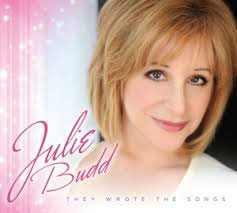 What makes your new CD so special for you and for all your fans?
What makes your new CD so special for you and for all your fans?
What makes it special is I’m tipping my heart to the traditional ‘American Songbook.’ I think of the ‘American Songbook’ as a younger entity. We have a lot of new writers today who will be the writers carrying the torch on for the future. I decided to do a CD filled with unforgettable songs, written prior to 1965. I’ve included songs by Anthony Newley & Leslie Bricusse, John Lennon & Paul McCartney, Ann Hampton Calloway, Paul Anka, Steve Dorff (who wrote with Kenny Leon). The CD is also available on CD Baby, itunes, and at Amazon. I wanted it to be the songs of our generation, the ones we grew up with; I think of the American songbook as a continuous artistic process.
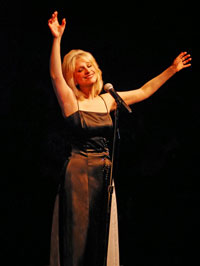 When you perform, your audiences meet a performer who truly knows the art of performance and communication. How did you develop your particular style of performing?
When you perform, your audiences meet a performer who truly knows the art of performance and communication. How did you develop your particular style of performing?
For me it’s all about creating a connection, that’s especially necessary in live performance. The art of live entertainment is several-fold. I think you need to be born to do this kind of work, to understand it instinctively. I’ve learned a lot since I began; I was about ten years old.
Doing a show is creating an entity, like a Broadway show. I put all the pieces together, and each moment is a moment in its own. The show has a flow – a beginning, a middle and an end. I want people to be happy before I even open my mouth to sing or talk to them. There needs to be a sense of art, of interest, a sense of anticipation that something magical will happen.
The show starts the moment the audience walks into the venue, even before I get on stage. I’m there to release people from their day. When the audience comes to watch a great play or a great film, they‘re in a darkened room or theater and they want to leave their day behind. It’s up to me to create this. I want them to have a good time, that they’ll be happy going on a journey with me.
What do you keep learning about the art of performing and about yourself as you perform?
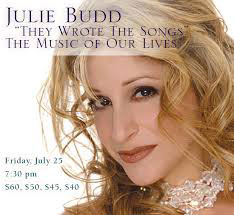 I’m always evolving. I have to keep learning. I’ve learned from the great ones who I’ve worked with, that I’ve taken my cues from. Every day there’s something new to learn.
I’m always evolving. I have to keep learning. I’ve learned from the great ones who I’ve worked with, that I’ve taken my cues from. Every day there’s something new to learn.
I have to pay attention and keep asking: Where I can be a better communicator? That’s what makes you a better performer. If you’re nervous, and it’s not such a terrible thing, because it keeps you more alive, more interested.
As you’re a performer you’re in a wonderful position to say great things through performing. A show grows as you grow. It does take certain things to keep going: stamina, a sound, a fearlessness. As I’ve gotten older, I’ve refined how I work, how I create, what my method is, and I’ve learned to create my own way of working. Over time you create your own casserole, your recipe, and that why every performer is interesting. Everyone’s sound is totally unique. You can hear the same song from ten different people, and they’ll all sound fabulous.
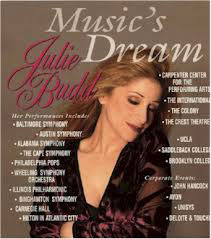 How did you choose the songs you sing in your show?
How did you choose the songs you sing in your show?
It starts with the text; the material has to suit me. It’s like putting on a suit. It has to fit. There are those parts that just fit perfectly, there are those parts where I learn something new about myself – it stretches you and allows you to grow.
I think when you pick the right material in the right key for yourself, it really fits you at that right time in your life. If you gave the same song to Shirley Bassey, Maureen McGovern and I, we would all do it with a different take. So it’s knowing how to put the right arrangement and the right interpretation onto the text and when you put it all together you’re able to make magic. You don’t always know whether it will work when you’re rehearsing; it’s very personal.
I started out doing material that I knew instinctly was right for me, and over forty years the material has suited me. I knew this material was right for me. Now we’re like ‘old friends traveling together,’ as I grew up with the material.
When Yul Brynner did “The King and I” in the original production on Broadway, and then when he did it there years later, I’m sure he had changed and he found new ways to bring the show and the part alive. Hal Holbrook has been doing his “Mark Twain Tonight,” or you with your show over the years you’ve been doing it, I’m sure it’s changed and so have you. That’s what keeps it interesting. You allow your life to color the material.
You’re also faced with audiences that can sometimes get distracted from so much on their mind, plus all the technology they’re using every day.
It’s true, we’re living in the technological age and while human beings may be on Facebook and Twitter, they really do want to connect. That won’t ever change. How we do it may, but people need to be touched.
They say babies need to be touched so they’ll thrive. Audiences are the same way. They come to see my shows, and they’ve told me that they feel when they’ve come, they’re meeting a real person, an old friend; I’m very flattered.
The songs you sing also touch on something that has been around for a very long time.
They are primal. Whether the audience is young or older, married or not, the songs are about the human condition. I choose writers who write songs about ‘something.’ Often I may want do a song with a great arrangement but I always know it has to be about something. You have to have a good foundation. A great song will connect with people.
My show is a series of little scripts. When I pick material I’m drawn to those writers who have something to say and I feel it; I can hear myself singing it. I never do a song unless I feel that.
You’ve also had the good fortune of performing with some of the most extraordinary performers – from Frank Sinatra to Liberace to Carol Burnett. What kinds of lessons did you learn from them?
I’ve learned from all of them. Each one of them was highly unique. Each one of them was a teacher for me.
I will never forget when I worked with Sinatra. He was ultra-generous. He taught me about the technical aspects of the business. I learned from Carol Burnett to perpetually be a student. That’s just who she is. She’s always improving her craft. Before we went into the studio to record together, she taught a stretch class.
Then there are those times when a rare person will come into your life. For me, that was Liberace. I had an incredible close relationship with him. We would talk so much together, about having a real life, being a humble person. I knew him from the time I was fifteen until he passed. He was very dear to me, and we had a long friendship. In my house I have a very special chair he had made for me. We were very dear friends; he gave me so much to me as a friend and as an artist, I will never forget it.
What have you discovered working with audiences across America and around the world? Are they very different?
I used to think when I was young I had all the answers. But you find out there’s so much more to learn. I used to think audiences were different in Minnesota, or in Chicago or in St. Louis. Perhaps when we didn’t have the kind of communications we have now, small towns were small towns. Probably things were like that.
But today everyone is chatting on the internet on Facebook, from Brooklyn to Zimbabwe, to everyone around the world and so many of us are experiencing the same information at the same time. I see it as a positive thing, because I can take a show as sophisticated as mine to New York City or to a small town in Wyoming, and they’ll appreciate the material in my show.
I like to feel ‘heart and soul’ is the driving element of what I do. I bring material I feel is true, and if the audience feel it’s true; that’s my number one goal. I feel there’s a certain warmth about my show; I want people to feel that warmth.
I’ve always instinctly sung this way, even before I studied and became a seasoned performer. I’m always trying how to learn to be better, to be a better musician. I train my voice every day. I try to connect to my work on a very personal level, or else would anyone want to come to see me. They could stay at home and listen to my CD. But I want them to feel the song. That’s my greatest goal, and if I can make the word come off the page, when I’m singing about love or loss, if I’m connected to it, then the audience experiences it as I’m doing it. I think that’s what it’s about – bringing something alive and real into the lives of my audiences – to really connect everyone to the universe. That’s what makes what you have to offer rich. That is ‘gold.’ •
























